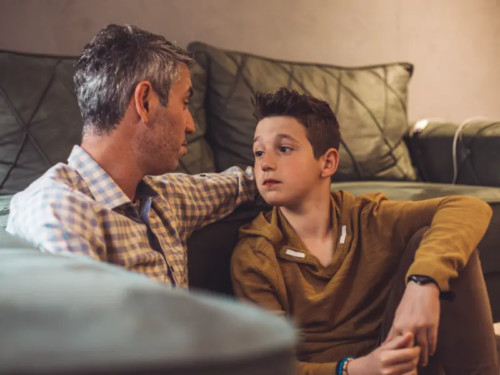
Table of Contents
What’s the Best Therapy for Trauma?

Written By: Dr. Rasna Kaur Neelam

Clinically Reviewed By: Dr. Don Gasparini
Updated: January 26, 2024
5 min.
For people who have survived trauma, certain types of therapy may work better than others. Here's what you need to know about the best therapies for trauma.
Learn more about our Clinical Review Process
Table of Contents
Trauma is, unfortunately, common, with more than half of people enduring a traumatic experience during their lifetime, data shows. And rates of childhood trauma are even higher, with more than two-thirds of children reporting a traumatic event by age 16.
While it is common, trauma is also treatable. Therapy has been shown to be effective in treating a range of trauma-related conditions, helping people process and heal sustainably. This is essential since many trauma-related disorders, like post-traumatic stress disorder (PTSD) and complex trauma, won’t resolve by themselves. Also, therapy can teach trauma survivors practical coping skills for managing challenging trauma or PTSD symptoms.
Below, we delve into the best kinds of therapy for trauma, including PTSD treatment, therapy for childhood trauma, and more.

Begin healing from trauma today
We offer virtual, trauma-informed therapy for survivors.
What is the best therapy for trauma?
There’s more than one therapy that can be effective for treating trauma. In fact, research shows that a handful of trauma-focused therapies have shown efficacy in trauma treatment.
Regardless of the therapeutic modality, though, it’s important to work with a mental health clinician who is trauma-informed, meaning they consider how trauma affects a person’s overall emotional well-being, thoughts, and behaviors. Working with a trauma-informed therapist can provide trauma survivors with the best, most comprehensive care possible. Below are five examples of different trauma treatment modalities.
Trauma-focused cognitive behavioral therapy (TF-CBT)
Often considered the gold standard for trauma therapy, trauma-focused cognitive behavioral therapy (TF-CBT) is specifically designed to address trauma in children and adolescents. It combines elements of standard cognitive behavioral therapy (CBT) with techniques to help young people process traumatic experiences. By blending cognitive restructuring, exposure therapy, and elements of play therapy, TF-CBT equips young people with tools to navigate and address challenges posed by their traumatic experiences.
Eye movement desensitization and reprocessing (EMDR)
Eye movement desensitization and reprocessing (EMDR) is a therapeutic technique designed to alleviate the distress associated with traumatic memories. During EMDR therapy sessions, people work with a trauma therapist to recall distressing experiences while engaging in bilateral stimulation, which can include following the therapist’s hand movements with their eyes or experiencing tactile sensations like tapping. This bilateral stimulation helps the brain process trauma in a less distressing way. By engaging in EMDR therapy, people can gradually diminish the emotional intensity of their traumatic memories, allowing them to deal with them directly.
Dialectical behavior therapy (DBT)
Primarily a skills-based therapy, dialectical behavior therapy (DBT) can give people tools to cope with the effects of trauma. DBT for trauma may be particularly helpful for those experiencing significant emotional changes due to a past traumatic experience, including people with PTSD. DBT skills like mindfulness, distress tolerance, emotion regulation, and interpersonal effectiveness can help manage intense emotions linked to trauma, especially in moments when someone feels triggered.
Narrative therapy
Narrative therapy is a therapeutic approach that helps people reshape their personal narratives, which, for a trauma survivor, may include telling their stories in an empowering way. Narrative therapy can help people coping with trauma shift the focus away from the trauma itself and instead view their experiences through a lens of personal growth and empowerment. Through this process, trauma survivors can feel empowered.

Prolonged exposure therapy
Many people cope with trauma by avoiding traumatic memories, but prolonged exposure therapy helps people confront these traumatic memories in a safe and helpful way. This approach encourages a trauma survivor to gradually face their traumatic experiences with the support of a trauma therapist, allowing them to process these memories more effectively. By repeatedly exposing themselves to the memories of a past traumatic event, people can reduce the power the traumatic event holds over them and develop a greater sense of control. Prolonged exposure therapy empowers people to confront their past traumas with courage and resilience, ultimately fostering healing and growth.
Somatic therapy
Somatic therapy uses mind-body approaches to address mental health conditions. By focusing on bodily sensations, movements, and experiences, somatic therapy helps people access and process traumatic memories stored in the body. Through techniques such as breathwork, mindfulness, and gentle movement, somatic therapists guide clients in reconnecting with their physical sensations and releasing tension and trauma held in the body. This approach can be particularly effective for people who have experienced trauma-related dissociation or have difficulty accessing their emotions through traditional talk therapy alone.

Role of medication in trauma therapy
Medication alone is not usually considered a primary treatment for trauma, but it can be used in conjunction with therapy to address specific trauma-related symptoms, like depression and anxiety. Medication may also be helpful for people who experience significant distress or impairment from trauma symptoms, like those with complex trauma or PTSD symptoms, who may need additional support alongside therapy.
Commonly prescribed medications for trauma-related conditions may include antidepressants, anti-anxiety medications, or mood stabilizers. These medications can help reduce the severity of symptoms, making it easier for people to engage in therapeutic trauma or PTSD treatment and learn coping skills.
However, it’s essential for medication to be prescribed and monitored by a qualified healthcare professional, such as a psychiatrist, who can tailor treatment to a person’s needs and ensure safety and effectiveness. Ultimately, the decision to use medication in trauma therapy should be made collaboratively between the individual and their healthcare provider, taking into account their specific symptoms, preferences, and treatment goals.

Trauma therapy at Charlie Health
If you or a loved one is struggling with a trauma-related mental health condition, Charlie Health is here to help. Charlie Health offers a virtual Intensive Outpatient Program (IOP) with more than once-weekly mental health treatment for young people and families dealing with complex mental health conditions, including childhood trauma, complex trauma, post-traumatic stress disorder (PTSD), and other trauma-related conditions. Our expert clinicians incorporate a range of trauma-informed, evidence-based therapies into individual counseling, family therapy, and group sessions. With this kind of holistic treatment, managing trauma and PTSD symptoms is possible. Fill out the form below or give us a call to start healing today.




